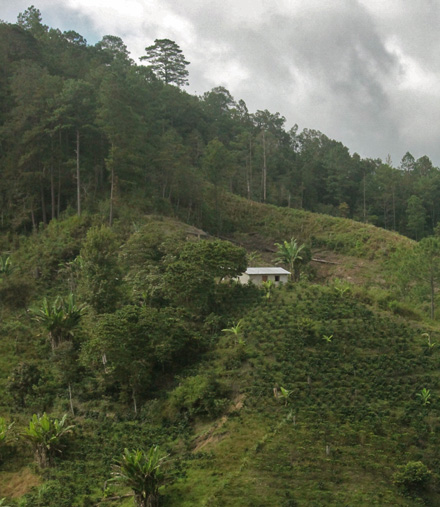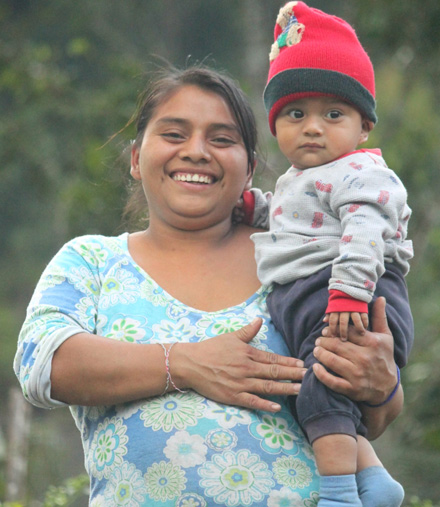
Winding high through the coffee-producing hills of the municipality of San Francisco de Opalaca in western Honduras, past the main pueblo and up a steep dirt road, you eventually reach the tiny community of Santa Cruz Rio Negro, which has a population of 250. There, in a small concrete and tin-roofed home nestled in the scenic, fog-covered mountains, lives Jose Bonifacio Sanchez Lemus, his wife Sandra Dominguez, and their five children.
San Francisco de Opalaca is one of the poorest regions of Honduras, with more than 90 percent of the population living in poverty and 70 percent living in extreme poverty. Heifer International, in partnership with Keurig Green Mountain, is working with families in this region to build sustainable solutions to poverty and hunger.
During the rainy season, access to the tiny coffee-producing communities that make up San Francisco de Opalaca can be difficult, if not impossible. Poor infrastructure, washed-out roads, and landslides further isolate these remote communities. On a recent visit to meet with Jose Bonifacio, we had to trade our truck in for a more suitable mode of transportation that could handle the slick, muddy roads: a mule.
After a long, bumpy ride up the mountain, Jose Bonifacio and his children greeted us. In June of 2014, the family received the gift of a family garden from Heifer International, which included seeds, fruit trees, and education and training on how to prepare and maintain the garden. Jose Bonifacio beamed with pride when he spoke about his family garden. "My first harvest was excellent and produced a lot of food for our family," he said. "In addition to the food it supplied for my family, our neighbors always stopped by to purchase vegetables from us, especially our carrots since we had an excellent crop. I sold my produce for a very good price and my family income improved. My children ate, and with the extra income I was able to buy other types of food products that we didn't have before."

Jose Bonifacio explained that before receiving his garden, he didn't have a way to earn extra income during the coffee harvesting off-season. In coffee-producing communities throughout Central America, los meses flacos, or the "thin months," is a period of food insecurity when income dwindles after the last coffee harvest. During this time, prices for staple crops, such as rice and beans, rise. This seasonal fluctuation in income leaves many families unable to provide enough to eat, let alone afford medicine or clothing, for their children. But Heifer International is helping families to get through these periods through gifts of livestock and seeds that provide families with nutritious foods and the means to earn extra income through the sale of byproducts, such as eggs, cheese, and fruits.
With the help of Heifer International, Jose Bonifacio planted carrots, broccoli, radishes, onions, and six types of fruit trees. Sales from his first harvest alone brought in $100. "With this income I can better my farm and pay workers to do some of the work that I can't do alone. I am also using this income to buy medicine for my family and other food products that have been missing from our diet."
Elaborating on the benefits of his garden, Jose Bonifacio said, "The most significant change that I have seen in the community is that it is becoming self-sustaining because now we don't have to go outside of the community to purchase our food. Now we can get fruits and vegetables right here in the community, and that is helping to improve the local economy."
An important component of the family garden is not only the plants and seeds that a family receives, but the education and training that go along with these gifts. Jose Bonifacio was eager to learn new farming techniques, such as composting and organic methods for pest control, observing that now his children will "have organic fruit, not conventional fruit that is grown with chemicals and that release toxins."
Jose Bonifacio’s garden is not only allowing him to cultivate fruits and vegetables for his family, but it is also cultivating self-sufficiency, allowing Jose Bonifacio to earn extra income and to provide local organic food to members in his community.
Story and photos by Christina Hirsch, Communications Officer, Heifer Honduras
